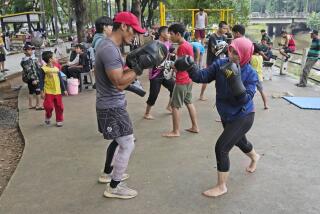War-Ravaged Cambodia Racked by Domestic Violence
- Share via
PHNOM PENH, Cambodia — Sixteen-year-old Bun Mondat had watched it happen countless times.
His brother-in-law battered the women in the extended family’s household every day. Now he was beating Bun Mondat’s aunt about her head.
But this time was worse. The brother-in-law pulled a gun and screamed at the woman, “I will kill you!”
Grabbing the pistol, Bun Mondat put an end to the attacks--shooting his sister’s husband dead, an act for which he recently was sentenced to two years in prison.
Researchers say domestic violence has reached epidemic proportions in Cambodia. They blame nearly three decades of war and political turmoil that have eroded Cambodian social norms.
A study released July 29 estimated that one in six adult women suffers abuse, much of it severe.
“This means that almost a quarter of a million women are being injured,” said Erin Nelson, head researcher of the Project Against Domestic Violence, a local nonprofit group.
Channels for dealing with the violence are almost nonexistent. There are no support groups, no professional counseling, no laws to protect victims.
A few shelters for women exist. But divorce is the only real recourse, and it is usually slow, with judges trying to mediate even when women may be in life-threatening situations.
Researchers said it was difficult to compare findings with those from other countries because means for collecting data vary greatly.
But the abuse survey found that 75% of the people interviewed knew at least one family in which domestic violence existed, compared to 9% in a similar study in Malaysia.
The Cambodia survey was financed by the Montreal-based International Development Research Center and performed by the Ministry of Women’s Affairs and the Project Against Domestic Violence.
Researchers fanned out through six provinces and Phnom Penh between June and September of last year, interviewing members of 2,764 households.
Researchers say the nearly continuous warfare since the late 1960s has led to an “alarming” level of abuse.
The brutal reign of the Khmer Rouge from 1975 through 1978, when up to 2 million Cambodians died from execution, starvation, forced labor and disease, particularly affected many people’s perspective on violence, they say.
“After 1979, men changed,” one victim told researchers.
“Nine out of 10 men were broken, or koch, nasty,” she said. “During the Khmer Rouge period they had no happiness at all. Now that they are free, men do whatever they want.”
War also tore apart closely knit families, leaving many women with no place to turn for shelter or support.
Victims and their relatives, like Bun Mondat, increasingly respond to violence with violence--and pay for it in jail.
Sar Samen, director of the Project Against Domestic Violence, offered the example of a battered woman in the central province of Kandal.
She was badly beaten and abused daily by her husband. After three days and nights of being raped and battered in 1994, the woman--four months pregnant--blinded him with an ax.
The woman received a one-year prison sentence. That was considered short, and it came only because her husband confessed in court to abusing her.
One of the only legal references to domestic violence in Cambodia is in the 1989 Marriage and Family Law, which states that divorce can be granted if a spouse is “cruelly and badly beaten.”
Cathy Zimmerman of the Project Against Domestic Violence notes that under the current law even when a woman is badly beaten, the court is mandated to persuade her to drop the case, then undertake reconciliation.
Legislation aimed at protecting women is unlikely to see action in Parliament soon.
Soeun Vouchleng, undersecretary of state in the Ministry of Women’s Affairs, said in an interview that the government must deal with other problems first.
“The fundamental thing is to improve the living condition of the Cambodian community,” said Soeun Vouchleng.
More to Read
Sign up for Essential California
The most important California stories and recommendations in your inbox every morning.
You may occasionally receive promotional content from the Los Angeles Times.













